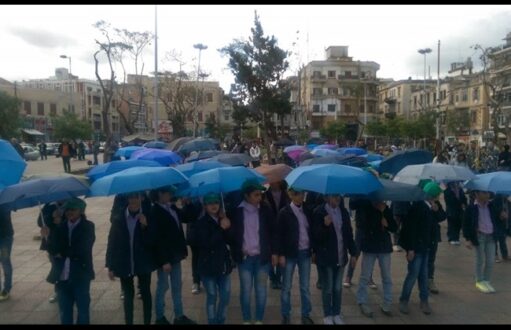TRIPOLI, Lebanon: Social Affairs Minister Rashid Derbas lashed out at former Prime Minister Najib Mikati Friday, accusing him of obstructing development projects, including a controversial underground parking lot, in the northern city of Tripoli.
The war of words between Derbas, who is close to Prime Minister Tammam Salam, and Mikati, both natives of Tripoli, cast gloom over attempts to carry out development projects in Lebanon’s second largest city, which has been ravaged by several rounds of sectarian fighting between supporters and opponents of Syrian President Bashar Assad in the past few years.
The Tripoli municipality has vowed to go ahead with a project to build an underground parking lot in Tripoli’s historical Al-Tal Square despite Mikati’s opposition and vehement protests from civil society denouncing the move.
Dozens of activists and members of civil society staged a sit-in Friday on Al-Tal Square to protest the parking lot project. They demanded that the project be replaced with plans that would help set the wheel of social and economic development into motion in the city, which has many impoverished neighborhoods.
Protesters argue that the history that Al-Tal Square represents would be compromised by the construction project. They say the project would alter the area’s traditional characteristics and landmarks and endanger its historic buildings.
But Derbas strongly defended the project. “Al-Tal parking lot is part of an overall project that has been fully studied and debated and we have to move to a more important [project],” he told a news conference at his office in Tripoli.
Derbas said he had sought with Justice Minister Ashraf Rifi and Minister for the Displaced Alice Shabtini, with backing from Salam, Speaker Nabih Berri and Finance Minister Ali Hasan Khalil, to allocate $85 million to implement several projects in Tripoli.
“Since then, I have been subjected to a campaign of personal insults by people employed by Mikati or his supporters, even though in my last meeting with [Mikati] we agreed that these projects are essential for the city,” Derbas said.
But the agreement, he added, vanished following remarks on Facebook by Mikati’s supporters accusing Derbas of being “a minister by coincidence” and “a minister of darkness with a disgraceful union past.”
Derbas said the Social Affairs Ministry, in cooperation with ESCWA, the Arab Cities Organization and the Tripoli municipality, had conducted a socio-economic survey of the city. Following the survey, international organizations and a number of countries had shown interest in development projects in Tripoli and the north, he said.
Derbas added that Saudi Ambassador to Lebanon Ali Awad Asiri had told him that Arab Gulf states had earmarked about $700 million for development projects in the north.
He invited Mikati to a TV debate to discuss what projects would be useful for Tripoli.
Derbas also criticized the Mikati government for failing to act to stem the flow of Syrian refugees, when their number in Lebanon reached 1 million.
“What is better for Tripoli: a fictitious $100 million and funds hanging up in the air, or a real $85 million, which trouble-mongers are trying to prevent [the city from] spending?” Derbas asked.
For his part, Mikati reiterated his opposition to the parking lot plan in Al-Tal Square, saying it should be part of a comprehensive project in the area.
“We reject the building of a parking lot in Al-Tal without a comprehensive rehabilitation project for the area,” Mikati told representatives of civil society in Tripoli. “This parking lot is considered a mistake against the city without any justification as long as there are other projects that are a pressing priority for the citizens.”
“We support a comprehensive development operation for Al-Tal Square with all its passageways and streets,” he added.


